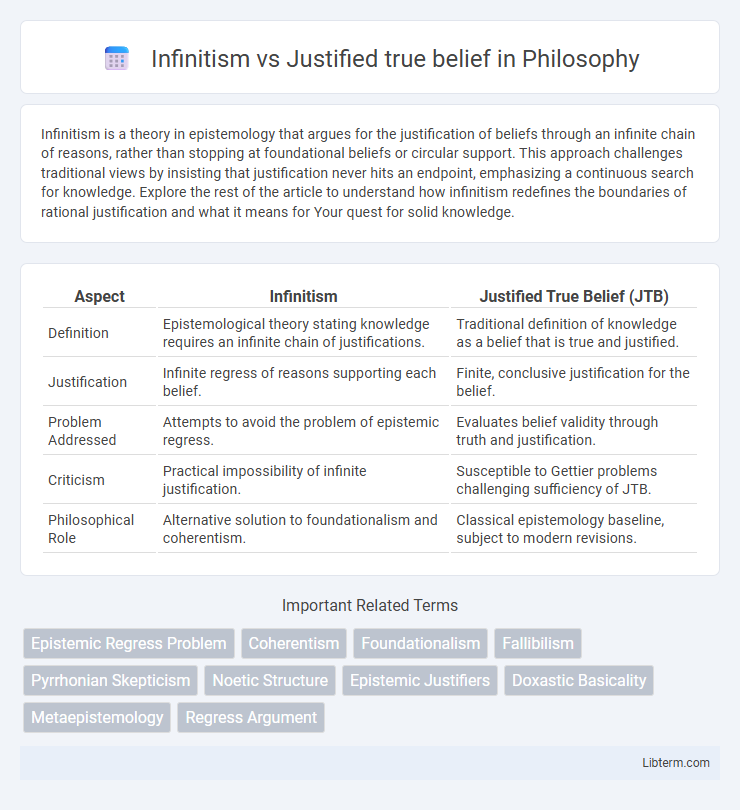Infinitism is a theory in epistemology that argues for the justification of beliefs through an infinite chain of reasons, rather than stopping at foundational beliefs or circular support. This approach challenges traditional views by insisting that justification never hits an endpoint, emphasizing a continuous search for knowledge. Explore the rest of the article to understand how infinitism redefines the boundaries of rational justification and what it means for Your quest for solid knowledge.
Table of Comparison
| Aspect | Infinitism | Justified True Belief (JTB) |
|---|---|---|
| Definition | Epistemological theory stating knowledge requires an infinite chain of justifications. | Traditional definition of knowledge as a belief that is true and justified. |
| Justification | Infinite regress of reasons supporting each belief. | Finite, conclusive justification for the belief. |
| Problem Addressed | Attempts to avoid the problem of epistemic regress. | Evaluates belief validity through truth and justification. |
| Criticism | Practical impossibility of infinite justification. | Susceptible to Gettier problems challenging sufficiency of JTB. |
| Philosophical Role | Alternative solution to foundationalism and coherentism. | Classical epistemology baseline, subject to modern revisions. |
Introduction to Epistemology
Infinitism and Justified True Belief (JTB) are foundational theories in epistemology addressing the nature of knowledge and justification. JTB posits that knowledge consists of beliefs that are true and justified, while Infinitism challenges this by arguing that justification requires an infinite, non-circular chain of reasons. This debate emphasizes the complexity of epistemic justification and the criteria for what constitutes knowledge in philosophical inquiry.
Defining Infinitism in Knowledge
Infinitism in epistemology posits that knowledge justification relies on an infinite, non-repeating chain of reasons, contrasting with the finite structures of justified true belief (JTB). Unlike JTB, which requires a belief to be true, justified, and held, Infinitism rejects foundational stopping points, asserting that each justification demands a further reason ad infinitum. This approach challenges classical foundationalism and coherentism by advocating for endless epistemic support in the pursuit of knowledge.
The Justified True Belief (JTB) Model
The Justified True Belief (JTB) model defines knowledge as a belief that is both true and supported by sufficient justification, serving as the traditional framework in epistemology. This model maintains that for a belief to be considered knowledge, it must be factually accurate and grounded in credible evidence or rational support. Critics highlight challenges such as Gettier problems, which reveal situations where JTB fails to account for certain truths, prompting alternative theories like infinitism.
Historical Background of Epistemic Theories
Infinitism emerged as a response to the classical justification models in epistemology, challenging the finite regress problem inherent in Justified True Belief (JTB) theory, which traces back to Plato's "Theaetetus." Historical debates around epistemic justification brought attention to the limitations of foundationalism and coherentism, positioning Infinitism as a theory advocating for an infinite chain of reasons to avoid arbitrary stopping points. This historical progression highlights how epistemic theories evolved to address problems of justification and knowledge acquisition through progressive critical analysis.
Comparing Foundations: Infinite Regress vs. Foundationalism
Infinitism in epistemology argues that knowledge is justified through an infinite chain of reasons, rejecting any stopping point in the justification process. Justified true belief, grounded in foundationalism, holds that some beliefs are self-evident or indubitable, serving as the ultimate foundation for other justified beliefs. The key contrast lies in infinitism's acceptance of an endless regress of justifications versus foundationalism's assertion of basic beliefs that halt this regress, ensuring a stable epistemic structure.
Strengths and Weaknesses of Infinitism
Infinitism addresses the regress problem in epistemology by positing an infinite, non-repeating chain of reasons for justification, providing a clear solution to avoid circularity and foundationalism's arbitrary stop. Its strength lies in its ability to accommodate an ongoing, dynamic process of justification without relying on unjustified axioms, enhancing the depth of epistemic support. However, infinitism faces the practical challenge of infinite cognitive capacity demands, and critics argue it complicates knowledge acquisition, as individuals cannot possess or access infinite justifications in real contexts.
Critiques of the Justified True Belief Approach
Critiques of the Justified True Belief (JTB) approach emphasize its vulnerability to Gettier problems, where subjects hold beliefs that are true and justified yet fail to constitute knowledge due to accidental correctness. Infinitism, as an alternative epistemological theory, addresses these issues by advocating for an infinite, non-repeating chain of reasons to justify beliefs, avoiding the regress problems faced by JTB. This approach challenges the foundational assumptions of JTB by rejecting the notion of finite justification and emphasizing the necessity of continuous evidential support.
Gettier Problems and Their Impact
Infinitism, as a response to the limitations of justified true belief (JTB), addresses the infinite regress problem raised by Gettier problems, which demonstrate cases where justified true belief fails to constitute knowledge due to epistemic luck. Gettier problems expose scenarios where beliefs are both justified and true yet fail to be knowledge, challenging the traditional JTB framework and prompting alternative theories like infinitism that propose an infinite chain of justifications. The impact of Gettier problems on epistemology has been profound, forcing a reevaluation of knowledge criteria and encouraging the development of frameworks that avoid the pitfalls of false premises or accidental truth.
Practical Implications for Knowledge Acquisition
Infinitism posits an infinite chain of justification for knowledge claims, challenging traditional epistemology's reliance on foundational beliefs or coherentist networks. Practical implications for knowledge acquisition include potential difficulties in finite cognitive processing, as individuals must continuously seek further justifications without end. This contrasts with the justified true belief framework, which assumes a finite, attainable basis for knowledge, facilitating more manageable methods for validating information in educational and scientific contexts.
Conclusion: Future Directions in Epistemology
Infinitism challenges the traditional justified true belief model by proposing an infinite regress of reasons as a solution to epistemic justification. Future epistemological research may explore integrating infinitist frameworks with dynamic, contextual approaches to knowledge validation. Advancements in formal epistemology and cognitive science could bridge gaps between infinitism and practical justification theories, fostering holistic understanding of knowledge acquisition.
Infinitism Infographic

 libterm.com
libterm.com